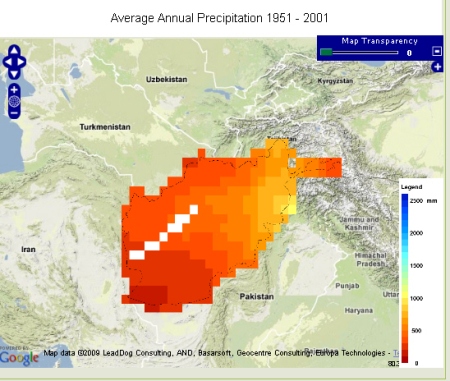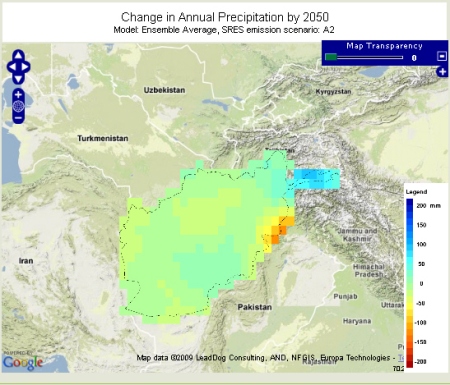BLOG
September 5th, 2009
Via Greenfryer, a report that among the many causes for conflict in southern Afghanistan, the lack of water may be to blame. As the article notes, Pakistan receives some of the waters of the Kabul River, and Iran from the Helmand, both of which are suffering from drought & climate change:
“…Those who follow the news will know that the “trouble†is predominantly in the south and southwest, particularly the provinces of Helmand and Kandahar. …Obviously all of the factors mentioned play a role, as do many others.
…What I offer here is not meant to try and dismiss those factors and replace them with just one, but rather provide some insight into what one of the fundamental factors is. Why the south? One word.
Water.
While most of Afghanistan is naturally fairly arid, the The Helmand River basin is particularly so, and in the past few decades it has been suffering severe deforestation and desertification. Predictably, as a consequence crop yields are in decline; both total yields and per capita production. Less water means less food. Less food means some starve.
Desertification is very much threatening Afghanistan and advancing in the northern, western and southern regions, where widespread grazing has reduced vegetation cover and exposed soils to erosion.
Another aggravating factor is the uncontrolled extraction of water resources and deforestation. Officials estimate the amount of forest lost in the last two decades to be 30 per cent. However, local forest officers suggest the true figure lies between 50 and 70 per cent in provinces like Paktya, Khost and Paktika.
In addition to desertification, the incidence of drought has also risen sharply in Afghanistan over the last 20 years, and more specifically in the last 6 years – a trend that might never be reversed. Conditions in large parts of Kandahar , Helmand and Nimroz provinces have deteriorated dramatically and some of these areas will never be able to support their former human populations again.
This news report underscores one of the main points I would like to make, that of positive social feedbacks. As people become increasingly desperate they turn to whatever they think may allow them to provide for their families today; overgrazing, overdrawing water supplies, illegal logging, the drug trade, corruption, religious and political extremism; anything that might work.
At best some of these choices do nothing to help fix or at least stop the problem from getting worse. Most of them do make the problem worse. They may allow the people to get through today, but it makes tomorrow even worse than it might have been, and hence drives even more people into making the same desperate choices, and so on.
The Aljezeera video report is wrong in one crucial respect, ascribing it all to immediate human causes. Afghanistan is not some isolated oasis sheltered from climate change. Like the rest of the world it has been progressively getting warmer.
And of course as we predict for most arid regions in the world, the consequence of climate change is declining precipitation. Mean annual rainfall has been dropping for decades.
While the change in rainfall seems to be least in the southeast the fact is that this entire region was already marginal to begin with. When you are right on the edge any change pushes you over. The region with the greatest change is the west and southwest, the other area of greatest conflict.
From government corruption to religious extremism, all of the factors mentioned play a role in how the Afghan War is playing itself out. However, many of those factors are rooted in desperate people making desperate choices, and that arises when people see no future for themselves or their children. Desperate people will do whatever they think they have to.
So what does the future hold? what are the chances that elections and troop surges will make a difference?
Not surprisingly, since we in the West are apparently determined to do nothing meaningful about climate change, the prognosis is that the situation in Afghanistan is only going to get worse. In fact much worse than I have suggested so far for at least five other reasons.
First, both the Helmund and the Kabul Rivers originate from the snows and glaciers of the Hindu Kush Mountains. As these disappear due to climate change the flows of the rivers decrease ie there will be even less water than the mere decrease in rainfall suggests. Indeed “The Kabul river itself is little more than a trickle for most of the year, but swells in summer due to melting snows.â€Â This means that there will be even less water available for irrigation, and so more desperate people.
Second, the problem is global, and just as these rivers will be drying up, so will almost all of the major rivers of Asia, putting a billion people under conditions from food stress to outright famine (here and here). As such the food aid and imports that Afghanistan currently receives will disappear.
Third, these same rivers are not simply sources of water for irrigation, but also act as sources of hydro-electric power. As such the loss of food and collapse of infrastructure will go well beyond that caused by the simple lack of water for irrigation.
Fourth, while not yet as progressed as the South, the rest of Afghanistan is basically on the same path. The stabalizing supports that the rest of the country is currently contributing will disappear as the other provinces have to deal with their own difficulties.
Fifth, Pakistan receives some of the waters of the Kabul River, and Iran from the Helmand. Like everywhere else they are and will be experiencing the same stresses. If Afghanistan draws more water from the rivers it will escalate tensions with these powerful neighbours who will themselves be desperate for every drop.
Probably a sixth one should be our cluelesness as to the real socio-political dynamic. Just last year we were celebrating the impact of climate change on Afghanistan because it would make for a poor poppy harvest. Overlooking the fact that it would make for a poor harvest generally, hence driving more people to desperation.
Whether the problem began as climate change alone which then led to logging and overexploitation of land and water, or if the overexploitation came first, or whether they ran in parallel, is now academic. The fact remains that:
- even if there had been no overexploitation of any form these regions would still be in trouble now because of climate change;
- even if we managed somehow to stop all of the overexploitation immediately the problem would continue to get worse because climate change would continue to drive it;
- the increasing aridity will push more and more people to make desperate, ultimately self-defeating choices, that will in turn accelerate the process.
What we are seeing now is that the more ecologically, politically and socially brittle regions of the planet devolve into violence and chaos first. However there is a metaphoric disassembly line operating. As marginal regions become essentially uninhabitable “failed statesâ€, other areas will degrade to marginal in turn, and on up the line (as discussed previously). As each begins it’s decline the social positive feedbacks will tend to accelerate the process.
Just look at Afghanistan, or Somalia, or Darfur if you want to understand what climate change really means for the future. Certainly each region is affected by it’s own unique circumstances and culture, and the particulars of who winds up shooting who, and the specific why will vary from place to place.
Two things that will not vary are:
- that ultimately it comes about because desperate people are making desperate choices. Choices they would not make if they had real options and opportunities.
- they do not have those opportunities because we in the industrialized world are making equally self-defeating choices, although ours are to preserve our luxuries rather than to attempt to meet our basic needs, at least for now.
So we can continue to send men and women to Afghanistan to kill and maim and to traumatize, and to be killed and maimed and traumatized themselves. What their sacrifices, and of the Aid workers and other development workers, and most particularly of the people of Afghanistan, actually mean is up to us. We caused the problem, continue to cause it, and they are being made to pay for it.
Are they sacrificing to help build a better, more just and equitable future? Or are they being sacrificed so that we do not have to live in a more just and equitable present? A present where we get our fair share rather than the gluttonous excess which we have been indulging ourselves with? Which are we going to choose? Which do you choose?










